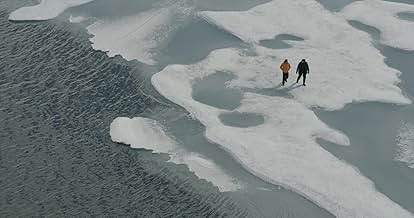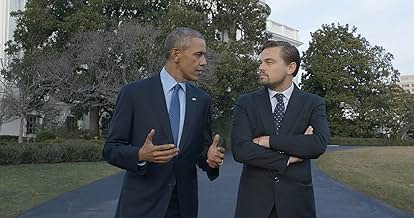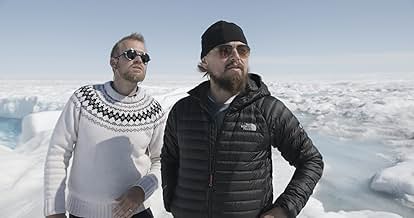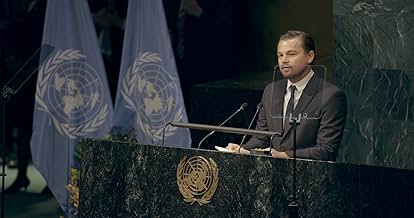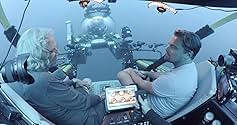Un regard sur la façon dont le changement climatique affecte notre environnement et ce que la société peut faire pour empêcher la disparition des espèces, communautés indigènes et écosystème... Tout lireUn regard sur la façon dont le changement climatique affecte notre environnement et ce que la société peut faire pour empêcher la disparition des espèces, communautés indigènes et écosystèmes menacés à travers la planète.Un regard sur la façon dont le changement climatique affecte notre environnement et ce que la société peut faire pour empêcher la disparition des espèces, communautés indigènes et écosystèmes menacés à travers la planète.
- Réalisation
- Scénario
- Casting principal
- Récompenses
- 2 victoires et 8 nominations au total
- Self
- (as Ban Ki-Moon)
- Self
- (as Michael Brune)
- Self
- (as Dr. Enric Sala)
- Self
- (as Dr. Michael E. Mann)
- Self
- (as H.E. Tommy E. Remengesau Jr.)
Avis à la une
This was probably the goal of the producers (among them Leonardo Di Caprio or Michael Scorsese) to appeal to a general audience. I must admit I watched it also for that reason. And I see no problem with that! I spare my comment on Leo Di Caprio's activism and work in that field for later as I know many argue that his activism is only his PR and so on...
But, I think the point here is the message of this movie, not the messenger. Visually it is excellent. Leo Di Caprio and all the crew takes us on all the places directly affected by the climate change and show us how the poorest countries on Earth suffer the most of the effects of climate change. They interview not only politicians, leaders and, the pope - but mostly scientists and local people from the most damaged areas. They connect how the oil industry and current energy giants like Exxon, Tepco and so on. lobby in US congress to buy their support and tacit consent, but not dwell too much on it - as if to shift the focus to nature with its stunning cinematography and rather appeal to people on that level, while showing how climate change already f*cked up Poles, forests, and coastal areas and how it's gonna f*ck up a many more areas and shape the politics and economy of the near future.
I also liked that despite his celebrity status Leo Di Caprio (the main interviewer) doesn't fall into false hopes and promises but keeps his mind open and skeptic. Because I think the goal of the movie is to show the reality of the long-term effect and not to wallow too much in short-term steps - like Paris 2015 conference.
Lastly, about Leo Di Caprio. You don't need to like him to enjoy this movie. And you can say whatever you want about his activism, the fact is that on the top of making this documentary, he drives an electric car, and a bike, uses his Facebook almost solely on promoting climate change actions and even spent his time during acceptance of his Oscar for The Revenant to speak about native Americans and climate change. So I don't think this is all just a stunt and PR! Who said that just because you are famous and rich you can't genuinely care and express your activism or can't worry about the planet and the civilization? I think this type of thinking is just another side of the same coin, people who criticize "celebrities" for not speaking out, and people who criticize "celebrities" once they do speak up, are in my opinion much more influenced by the celebrity culture than they think or can admit. It's no win situation when you put people in a mental box.
All in all,you can find some great piece of activism and cinematography in the documentary and I highly recommend for anyone who is ...a human being.
And if you are interested in deeper insights into how this climate change crisis intertwines with politics, corruption, war and economy, go and watch The Shock Doctrine, or have a look on the Zeigeist movie trilogy and The Zeitgeist movement.
The documentary itself is mostly well made. Leonardo travels from one place to the other, and talks with some big names. Some of it feels kind of irrelevant, and the best parts is when Leonardo talks with people who are not that famous, especially the one subject that shows her frustration. Some of the places he travels are interesting to see, though it's mostly quick visits, and at times they feel more like backdrops than important set pieces. Despite the documentary jumping from one theme to the next, it holds together quite well, and Leonardo's journey functions well as a mean to take the viewer through all the information.
Personally I would have liked a documentary that was a bit more science heavy, maybe like a combination of the nature trips that Leonardo goes on here, and the presentation from Al Gore's film. But I can understand why they went in the direction they went here, and I hope it resonates with a lot of people that have not thought much about this.
From the moment the movie opens we get a little glimpse at Leo's life as he talks about a Bosh painting that his father hung on the top of his crib, that started his passion for environmental issues. From then on, we realize that his documentary is not just for us it was for him as well.
Leo does not try to make himself out as an environmental expert. This is something I admire greatly about the documentary. A lot of us are being influenced on both sides of the argument about the climate change, and when Leo became the UN Ambassador of peace for this topic, he knew he needed to study up on the process, so he did it with Before the Flood. Leo travels all over the world to discover just how bad the problem actually is and what we can do to stop it.
But this doc is all about informing. Leo does not pretend to have the answers by a long shot. One of my fav parts of this movie was a discussion Leo has with an environmentalist from India whose calling out the United States for their part in Global Warming. Leo never defends his home country only comes clean about how realistic or unrealistic it is for America to go clean.
There was this one part of the film where Leo meets with his agricultural guy telling me that America needs to change it's diet. Pretty much telling me that I need to stop buying things like Doritos, which is a small part of a big picture, and by odd coincidence, I just happen to have a big bag of cool ranch in my lap. Granted, it would not hurt my waist line to give up the nachos, but there are other food products that poor Americans like myself would starve if they suddenly disappeared. Proving that this environmental issue for me anyway is not a black and white issue.
Leo created something that does what a documentary is suppose to do. His agenda was to inform you about the climate change and that's what he does, and he does it without having to make anyone look evil (well not too evil anyway). it's all about laying out the facts and seeing what we can do with that info.
Much respect.
Filmmakers are intelligent in their use of the biggest asset they have: not only do they keep their movie star on screen, they work hard to tie viewers concern for the environment up with his biography. Leonardo DiCaprio proves his own commitment to the cause; conceding that his own celebrity status draws attention to the topic, but allows the naysayers to say that he is a shallow movie star and therefore this whole issue must be a joke. Though, I have to admit that I was a bit disappointed that the movie lacks such personality. The film does have the unique access to a DiCaprio that is not on the set of a fictional project or in an awards ceremony tux, but he adds nothing aside from his name and face.
Correctly identifying the most important issue of our time, DiCaprio uses his authority and charisma to travel the world and highlight men impact on our planet. Indeed, he travels the globe examining our fossil-fuel addiction. Where the film succeeds the most is by focusing on the ground-level victims of climate change, such as the polar bears of the Arctic for instance. Of course, the documentary is enforcing the 2015 Paris agreement, in order to develop the wind and solar power.
So many climate documentaries have passed through cinemas and aired on TV, it's impossible to believe that lack of information is the obstacle to change in public policy. This documentary seems important to me as a shift in public opinion has to be achieved to change the political classes opinion. Finally, Before the Flood foes have one marvellous scene that its contemporaries won't have. Former Astronaut Dr. Piers Sellers sits down with DiCaprio in a dark room that is illuminated by a graphic of planet Earth and talks about how his experience in Space helped him understand the massiveness and beauty of the world. He highlights that if we can all see our presence in the world on a much larger scale than what is in front of us, we might be able to change our way of life before it is too late.
Overall, Before the Flood is a serious, substantial and very important piece of work.
Le saviez-vous
- AnecdotesReleased for free on the National Geographic YouTube channel.
- Citations
Leonardo DiCaprio: You are the last best hope of Earth. We ask you to protect it or we, and all living things we cherish, are history.
- ConnexionsFeatured in Docventures: Ilmastonmuutos (2017)
- Bandes originalesBefore the Flood
Composed by Trent Reznor & Atticus Ross, with Gustavo Santaolalla
Meilleurs choix
- How long is Before the Flood?Alimenté par Alexa
Détails
- Date de sortie
- Pays d’origine
- Langue
- Aussi connu sous le nom de
- Before the Flood
- Lieux de tournage
- Ushuaia, Tierra del Fuego, Argentine(Filmed in)
- Sociétés de production
- Voir plus de crédits d'entreprise sur IMDbPro
Box-office
- Montant brut mondial
- 988 $US
- Durée
- 1h 36min(96 min)
- Couleur


